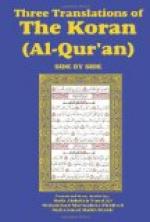4 Women found guilty of adultery and fornication were punished at the first rise of Islam, by being literally immured. But this was exchanged, in the case of a maiden, for one year’s banishment and 100 stripes; and in the case of a married woman, for stoning.
5 What took place in the times of ignorance, previous to the revelation of the Koran. See Freytag’s Einl. p. 201, as to the incestuous nature of the ante-Islamitic Arabian marriages.
6 By marrying without means adequate to the support of a free wife, or by remaining single.
7 From marrying slaves.
8 Games of chance, usury, etc.
9 By providing for them a home and the protection of a husband. Or, of that which God would have them care for.
10 An undutiful child is very seldom heard of among the Egyptians, or the Arabs in general. Sons scarcely ever sit, or sit, or eat, or smoke, in the presence of the father unless bidden to do so; and they often wait upon him and upon his guests at meals and on other occasions: they do not cease to act thus when they have become men. Lane’s Mod. Egypt. vol. i. p. 69.
11 The Koranic precepts as to prayer savour of Jewish origin. Thus, “Prayer should be said standing” is a Rabbinic precept.-Comp. Sura [xci.] ii. 240.- Misch.Berachoth 10-may be shortened in dangerous places, ib. iv. 10-is forbidden to the drunken, ib. 31, 2. Erubin, 64-and to the polluted; Berachoth iii. 4-and is to be preceded, in this case, by washings with water or sand. See Sura xvii. 110, note 2, p. 173. 1 Cor. xi. 21.
12 The Jews and their Rabbis.
13 See Sura [xci.] ii. 98.
14 Lit. the companions of the sabbath. See [xci.] ii. 61.
15 This refers to certain renegade Jews, who out of hatred against Muhammad, went over to the Koreisch. See Nöldeke. p. 149.
16 Lit. ripened.
17 Mecca.
18 And therefore a fit subject for plunder.
19 Some of the Meccans after embracing Islam did not thoroughly break with the infidels and fly their country. These persons were miraculously slain by angels at Bedr. Others suppose the angels to be Nakir and Monkir, who examine the dead in the grave.
20 That is, to what religion did ye belong?
21 And therefore could not resist the unbelievers.
22 Thus the Rabbins Tr. Berachoth, iv. 4, “He that goeth in a dangerous place may pray a short prayer.”
23 See Mischna Tr. Berachoth, 10.
24 This verse is said to have been revealed when Muhammad was about to acquit a Muslim who had committed theft, and laid the guilt at the door of a Jew. But the particulars are given in a very contradictory manner. See Nöldeke, p. 151.
25 In allusion to an idolatrous and superstitious custom of the old Arabians.
26 By the mutilation of slaves, branding their bodies, filing the teeth, etc.
27 See Sura lxxxiv. 24, p. 47, note.




